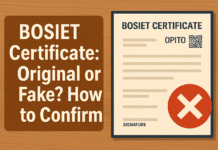
ISO 45001 Lead Auditor Certification
Introduction
ISO 45001 Lead Auditor Certification : In an era where workplace safety is of paramount importance, organizations worldwide are increasingly seeking ISO 45001 certification. ISO 45001 is an international standard for occupational health and safety management systems, and achieving this certification is a significant step toward ensuring a safe and healthy work environment. To facilitate compliance with ISO 45001 and enhance the overall safety culture, many organizations turn to ISO 45001 Lead Auditors. In this article, we will delve into the world of ISO 45001 Lead Auditor Certification, its significance, requirements, and the benefits it brings to both individuals and organizations.
Understanding ISO 45001
Before we delve into the certification process, let’s briefly understand ISO 45001. This standard outlines the requirements for establishing, implementing, maintaining, and continually improving an occupational health and safety management system (OHSMS). ISO 45001 is designed to help organizations reduce workplace accidents and illnesses, improve employee safety, and ensure legal compliance.
What is an ISO 45001 Lead Auditor?
An ISO 45001 Lead Auditor is a professional who possesses the knowledge and skills to assess and audit an organization’s OHSMS against ISO 45001 requirements. These auditors play a critical role in ensuring that the organization complies with the standard, identifies areas for improvement, and helps create a safer work environment. They are the frontline defenders of workplace safety.
Certification Requirements
To become an ISO 45001 Lead Auditor, individuals must meet certain requirements:
- Educational Qualifications: While there are no specific academic prerequisites, a background in occupational health and safety or a related field is advantageous.
- ISO 45001 Foundation: Most certification bodies require candidates to complete the ISO 45001 Foundation course as a prerequisite.
- ISO 45001 Lead Auditor Training: Candidates must undergo formal training from accredited training providers. This training typically covers ISO 45001 standards, audit techniques, and best practices.
- Audit Experience: To qualify for certification, candidates usually need to demonstrate a minimum number of hours or audits conducted. This practical experience is essential for understanding real-world applications of ISO 45001.
- Passing the Certification Exam: After completing the training and gaining the necessary experience, candidates must pass a certification exam to prove their understanding of ISO 45001 and auditing processes.
Benefits of ISO 45001 Lead Auditor Certification
- Career Advancement: Becoming a certified ISO 45001 Lead Auditor opens up new career opportunities. It can lead to roles such as safety manager, compliance officer, or consultant.
- Enhanced Skills: Certification equips individuals with auditing skills that are valuable in various industries. These skills include risk assessment, compliance evaluation, and problem-solving.
- Contribution to Safety: Lead Auditors play a pivotal role in promoting workplace safety. By helping organizations comply with ISO 45001, they contribute to reducing accidents and protecting employees.
- International Recognition: ISO certifications are globally recognized. Holding the ISO 45001 Lead Auditor Certification demonstrates competence in auditing to an international standard.
- Increased Employability: Many organizations prefer hiring certified professionals as auditors, making certified individuals more attractive to potential employers.
How to Become a Lead Auditor in Safety
Aviation Safety Certification from NQA
How to do NCSO Certification Online: A Step-by-Step Guide
Conclusion
In conclusion, ISO 45001 Lead Auditor Certification is a vital step for individuals looking to make a difference in occupational health and safety and organizations striving to create safer workplaces. It requires dedication, knowledge, and practical experience, but the benefits are well worth the effort. By becoming a certified ISO 45001 Lead Auditor, you not only advance your career but also contribute to the overall well-being of employees and the success of your organization. It’s a win-win for everyone involved.
























